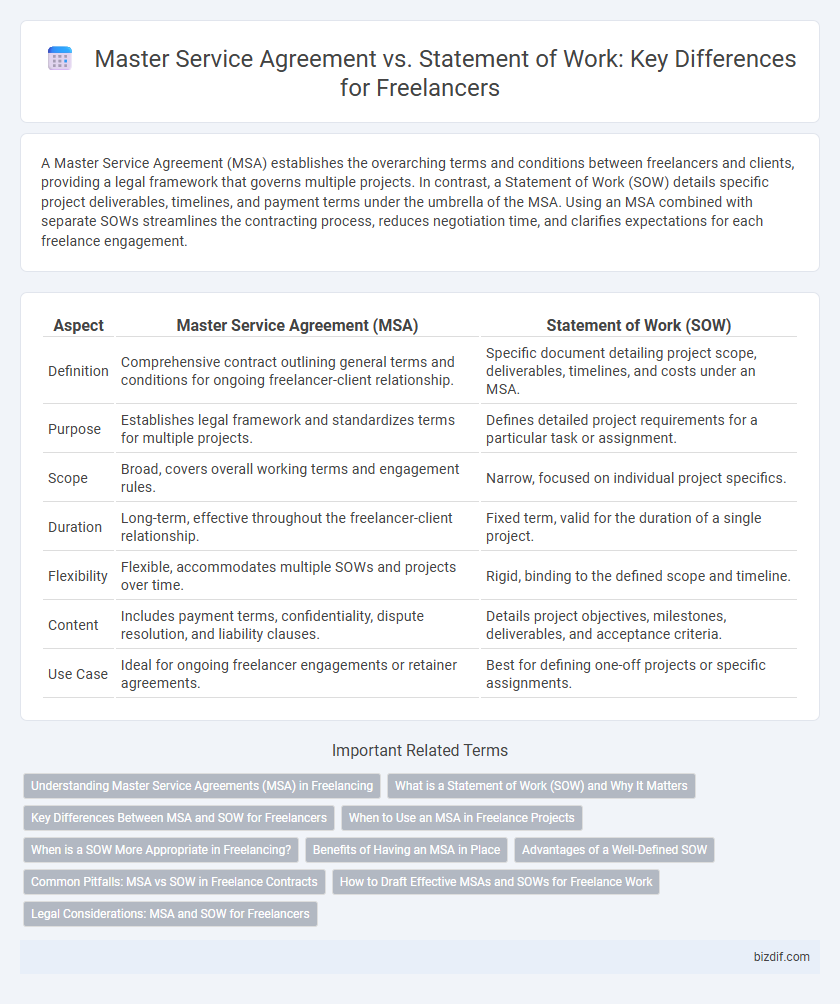A Master Service Agreement (MSA) establishes the overarching terms and conditions between freelancers and clients, providing a legal framework that governs multiple projects. In contrast, a Statement of Work (SOW) details specific project deliverables, timelines, and payment terms under the umbrella of the MSA. Using an MSA combined with separate SOWs streamlines the contracting process, reduces negotiation time, and clarifies expectations for each freelance engagement.
Table of Comparison
| Aspect | Master Service Agreement (MSA) | Statement of Work (SOW) |
|---|---|---|
| Definition | Comprehensive contract outlining general terms and conditions for ongoing freelancer-client relationship. | Specific document detailing project scope, deliverables, timelines, and costs under an MSA. |
| Purpose | Establishes legal framework and standardizes terms for multiple projects. | Defines detailed project requirements for a particular task or assignment. |
| Scope | Broad, covers overall working terms and engagement rules. | Narrow, focused on individual project specifics. |
| Duration | Long-term, effective throughout the freelancer-client relationship. | Fixed term, valid for the duration of a single project. |
| Flexibility | Flexible, accommodates multiple SOWs and projects over time. | Rigid, binding to the defined scope and timeline. |
| Content | Includes payment terms, confidentiality, dispute resolution, and liability clauses. | Details project objectives, milestones, deliverables, and acceptance criteria. |
| Use Case | Ideal for ongoing freelancer engagements or retainer agreements. | Best for defining one-off projects or specific assignments. |
Understanding Master Service Agreements (MSA) in Freelancing
Master Service Agreements (MSAs) in freelancing establish a comprehensive framework that governs the overall relationship between clients and freelancers, outlining general terms, responsibilities, payment structures, and intellectual property rights. MSAs streamline project execution by eliminating the need to renegotiate common terms for each new Statement of Work (SOW), which define specific deliverables, timelines, and project scopes. Understanding MSAs helps freelancers ensure consistent contract terms, reduce legal risks, and facilitate smoother client engagements across multiple projects.
What is a Statement of Work (SOW) and Why It Matters
A Statement of Work (SOW) is a detailed document that outlines the specific tasks, deliverables, timelines, and expectations for a freelance project. It serves as a critical tool to ensure alignment between freelancers and clients by clearly defining the scope of work, responsibilities, and payment terms. The SOW matters because it minimizes misunderstandings, provides legal protection, and establishes measurable criteria for project success within freelancing agreements.
Key Differences Between MSA and SOW for Freelancers
A Master Service Agreement (MSA) establishes the overarching terms and conditions governing the long-term relationship between freelancers and clients, while a Statement of Work (SOW) details specific project deliverables, timelines, and payment schedules. MSAs streamline the contracting process by reducing the need to renegotiate terms for each project, whereas SOWs provide clarity on individual project scope and responsibilities. Freelancers benefit from using MSAs for ongoing engagements and SOWs for precise project management and risk mitigation.
When to Use an MSA in Freelance Projects
Use a Master Service Agreement (MSA) in freelance projects when establishing a long-term relationship with a client involving multiple deliverables or ongoing services. The MSA outlines general terms, payment structures, confidentiality, and dispute resolution, providing a comprehensive legal framework for all future Statements of Work (SOWs). This approach minimizes repetitive contract negotiations and ensures consistency across diverse project scopes and timelines.
When is a SOW More Appropriate in Freelancing?
A Statement of Work (SOW) is more appropriate in freelancing when projects require detailed scope definition, specific deliverables, and timelines, ensuring clarity between client and freelancer. It provides granular control over project phases, milestones, and responsibilities, reducing scope creep and miscommunication. Freelancers benefit from SOWs in complex, fixed-scope assignments, where deliverables and payment terms must be explicitly outlined.
Benefits of Having an MSA in Place
A Master Service Agreement (MSA) streamlines ongoing freelancing projects by establishing standardized terms, reducing the need for repetitive contract negotiations and accelerating project kickoffs. MSAs offer clear frameworks for payment schedules, intellectual property rights, and confidentiality, minimizing disputes and enhancing trust between freelancers and clients. Implementing an MSA ensures consistent legal protection and operational clarity, enabling freelancers to focus on delivering quality work efficiently.
Advantages of a Well-Defined SOW
A well-defined Statement of Work (SOW) in freelancing clearly outlines project scope, deliverables, timelines, and payment terms, reducing misunderstandings and scope creep. It provides detailed expectations for both freelancers and clients, enhancing accountability and project management efficiency. This specificity simplifies dispute resolution and fosters transparent communication, ensuring smoother collaboration and timely project completion.
Common Pitfalls: MSA vs SOW in Freelance Contracts
Common pitfalls in freelance contracts arise from confusing a Master Service Agreement (MSA) with a Statement of Work (SOW), where the MSA defines overarching terms while the SOW details specific project deliverables. Misunderstanding this distinction can lead to scope creep, payment disputes, and unclear responsibilities. Freelancers should ensure the MSA outlines general conditions and the SOW explicitly specifies tasks, timelines, and compensation to avoid contractual conflicts.
How to Draft Effective MSAs and SOWs for Freelance Work
Drafting effective Master Service Agreements (MSAs) and Statements of Work (SOWs) for freelance work requires clear definitions of project scope, deliverables, timelines, and payment terms to minimize disputes. MSAs establish the overarching legal framework and responsibilities, while SOWs specify detailed project requirements, tasks, and milestones tailored to each engagement. Emphasizing precise language, aligned expectations, and thorough review enhances contract clarity and strengthens freelancer-client relationships.
Legal Considerations: MSA and SOW for Freelancers
Master Service Agreements (MSAs) establish the overarching legal framework, defining general terms, liabilities, and dispute resolution mechanisms for freelance projects. Statements of Work (SOWs) provide detailed descriptions of specific tasks, deliverables, timelines, and payment terms under the MSA's umbrella. Freelancers must ensure both MSA and SOW clearly outline intellectual property rights, confidentiality clauses, and termination conditions to minimize legal risks and maintain professional clarity.
Master Service Agreement vs Statement of Work Infographic

 bizdif.com
bizdif.com